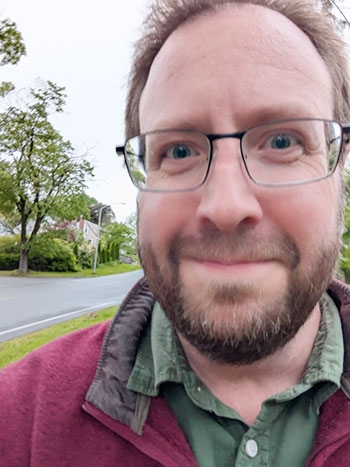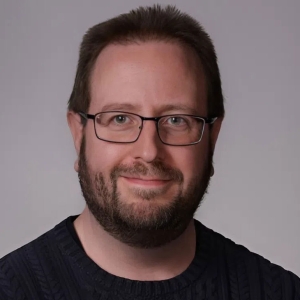For Matt Anderson, planning for his first Steinmetz Symposium as the new director of undergraduate research began last December. Anderson and Ruth Cotter, assistant to the dean of studies, met regularly with others on the planning committee for one of Union’s signature events.
It’s a heavy lift. More than 500 students show off their research, scholarship and creative pursuits. Classes are canceled to allow families, faculty, staff and students to support projects from every discipline.
When the 35th annual symposium arrived Friday, May 9, the only hiccup was a steady rain that fell throughout the day. Anderson and his team could take pride in knowing their months of planning paid off.
“It is a team effort, and the Steinmetz Symposium is only possible through the work of many students and colleagues across the College,” said Anderson. “Thanks to the work of so many and in spite of the gloomy weather, the day went smoothly. It was rewarding and inspiring to see all the outstanding, creative work that our students have done guided by their faculty mentors.”
Born in Princeton, N.J., Anderson grew up in neighboring Plainsboro. The town is the namesake of the fictional teaching hospital in the Fox TV series “House.” It is also mentioned in Orson Welles's famous 1938 radio broadcast, “The War of the Worlds,” about a fictional alien invasion.
Anderson received his undergraduate degrees in computer science and physics from Carnegie Mellon University, and his Ph.D. in computational complexity theory at the University of Wisconsin-Madison. Before coming to Union in 2014 as a visiting assistant professor, he did several years of postdocs at Cambridge University in England, working on logical and descriptive complexity; and at the Technion in Israel, working on arithmetic circuit complexity and derandomization.
Now associate professor of computer science, Anderson’s research expertise is in computational complexity theory, a field which studies the resources, like the time or memory used by a computer.
“Some of my recent work focuses on coming up with algorithms that multiply matrices using less time,” he said. “My students and I develop programs to search for faster programs to multiply matrices.”
Outside the classroom, Anderson is part of an employee group that has been playing the popular game, Dungeons and Dragons weekly since 2020.
“I enjoy being a gamemaster,” he said. “I get to build fun imaginary worlds for my friends to explore. That aspect is not so different from my day job as a professor. Our group regularly rotates GMs, but I'm the group's self-appointed emergency backup GM and can slap together, let's say, serviceable, adventures with no notice.”
It’s his passion for working with students that brings him the most satisfaction, however.
“I've worked with nearly 30 students on my research in the last 11years,” he said. “It inspired me to apply for the role as director of undergraduate research, which I have found to be immensely rewarding. I get to give out money to students to assist them in doing and presenting interesting projects, like we celebrate on Steinmetz Day.”
FIRST APP YOU LOOK AT IN THE MORNING:
I always intend to open the weather app first. But most days, I get distracted and open my email, instead, and then proceed to immediately forget about looking at the weather. If we're talking about apps I actually spend time in, it is the New York Times. I go there primarily for the daily puzzles: Connections, The Mini and sometimes Strands.
WHAT’S THE LAST GREAT BOOK YOU READ?
Blue Prince. This is a video game, not a book. It's a puzzle and exploration game with many layers to unravel, a la Myst. It's a sublime combination of a choose-your-own-adventure novel, a found-footage mystery, a cryptic crossword, a maze of escape rooms, and relevant social commentary. It has spontaneously caused a whiteboard to appear in my apartment covered in unresolved threads - if I had any yarn, maybe actual threads - and pieced-together conspiracy theories. That said, the game technically includes a number of books you can read within it, including “Blue Prince,” which is mid.
BEST ADVICE YOU EVER RECEIVED:
“Look for the helpers,” from Fred Rogers. Bonus fact: I watched his show all the time when I was a kid, though I've never met him. When I was in college in Pittsburgh, every day I would cut through the parking lot of WQED where “Mister Rogers' Neighborhood” had been filmed.
WHAT ARE YOU WATCHING RIGHT NOW?
For the last few years, only long-form, unscripted shows have held my attention. “Game Changer” and “Taskmaster” (UK, AUS and NZ) are great pseudo-game shows where talented people do silly and often clever things. I'm also catching up on various “Critical Role” spin-offs while they're building toward the start of Campaign 4.
ONE SKILL YOU WISH YOU HAD:
To play the piano. I can play at a beginner level and can read sheet music, but my sense of rhythm is dreadful. I do own an electronic keyboard, but it has been relegated to a second life as a laundry rack.
THREE DINNER PARTY GUESTS (living or deceased):
I'm not much into dinner parties, so instead I'll just mention some people who have impacted my worldview. Richard Feynman's books had a major influence on how I view problem-solving, science and science communication. Mrs. Gray was a teacher at my high school. Her AP English class is still the hardest class I've ever taken - she positively shaped my view of writing and what it means to be a teacher. Third, any one of the comedians from “The Daily Show” in the early 2000s. How I would answer this question has shifted over the years, but right now it's Stephen Colbert.
FIRST CONCERT:
The Los Angeles Philharmonic at the Hollywood Bowl during the summer of 2003. It was during a summer research program at the physics department at UCLA. My friends and I skipped the end-of-summer banquet to go to that concert. I remember we had a fun night. I remember the Hollywood Bowl. But I have zero memory of the concert itself. I do recall that we got scolded by the program organizer the next day for ditching the banquet.
LITTLE KNOWN FACT ABOUT YOU:
I'm a minimalist.
FAVORITE UNION MEMORY/EXPERIENCE:
The Computer Science Department and ACM-W, the student CS club, organize a yearly celebration of computer science at Union called CSFest. A couple of years ago, ACM-W (led by Jing Chen '23 and Fiona Shyne '23) created a murder mystery dinner theater event for CSFest. The plot was the supposed murder of one of our robots, VALERIE. All of the CS faculty were the suspects. CSFest attendees had to solve puzzles and follow clues to find the murderer. It was revealed that I was, in fact, VALERIE's fictional murderer. At the end, I delivered a "villain monologue" justifying the theoretical roboticide, a screed about the dangers of generative AI, which, ironically, I used generative AI to craft.
ONE THING YOU CAN'T LIVE WITHOUT:
Walking to work. I don't have a car or even a bike (see above). I've commuted daily on foot from Niskayuna along Nott Street for the last 11 years. If you add it all up, it is about five months' worth of walking on Nott Street. I'm often lost in thought about the day that was or will be, or in some other place entirely. Aside from having been hit by two cars (on different occasions), it's meditative and peaceful; the cars and trucks roll along like waves crashing against the shore. This may be one of the most well-known things about me: I only accept rides when it is raining and I've forgotten my umbrella. Though, I appreciate everyone from Union who has offered me a ride over the years.

